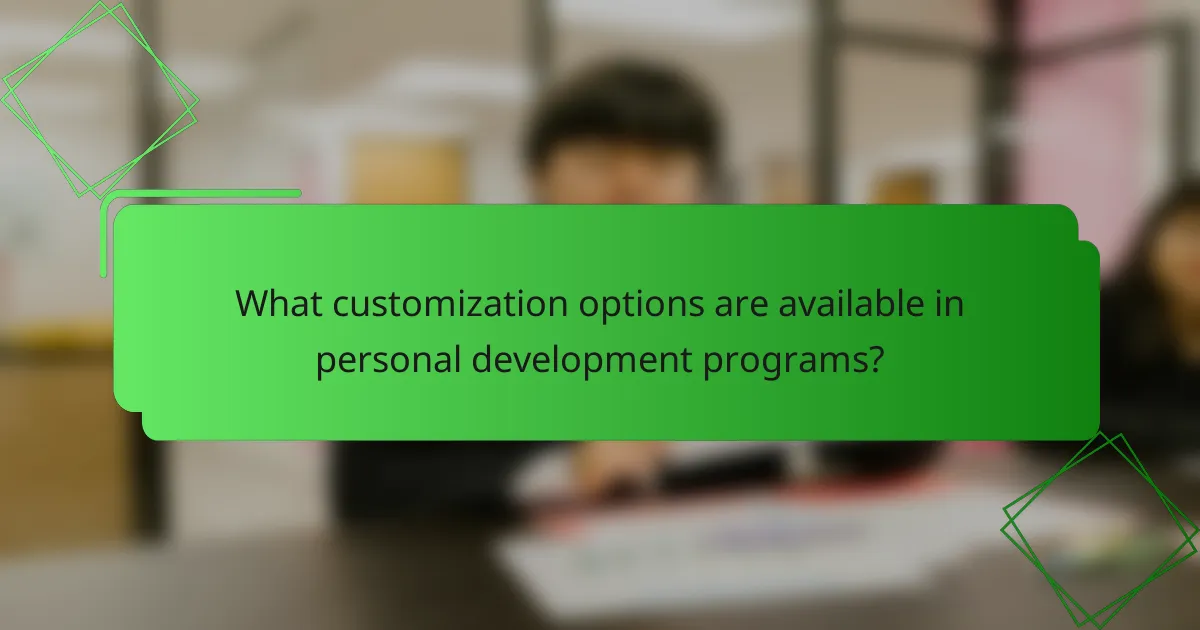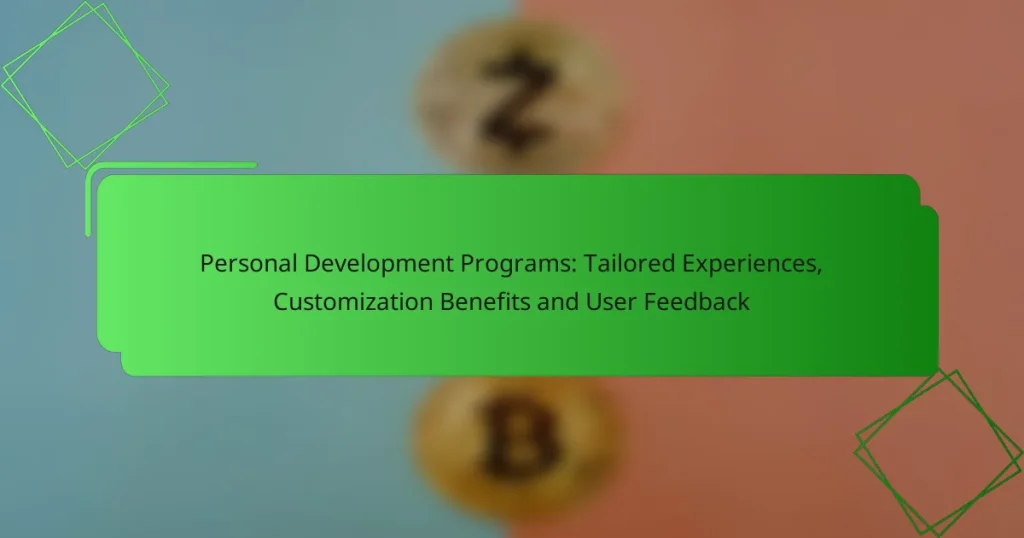Personal development programs are designed to provide tailored experiences that align with individual learning styles and goals, resulting in more effective skill acquisition. By enhancing engagement and motivation, these customized programs serve as a valuable investment in personal growth, allowing participants to achieve their aspirations with the necessary support and flexibility.

What are the benefits of personalized development programs?
Personalized development programs offer tailored experiences that cater to individual learning styles and goals, leading to more effective skill acquisition. These programs enhance engagement, improve outcomes, and boost motivation, making them a valuable investment for personal growth.
Increased engagement
Personalized development programs significantly increase engagement by aligning content with the learner’s interests and needs. When participants see relevance in their training, they are more likely to actively participate and invest time in the process.
For instance, a program that incorporates a learner’s specific career aspirations or hobbies can create a more immersive experience. This heightened engagement often translates into better retention of information and skills.
Improved outcomes
Tailored development programs lead to improved outcomes by addressing the unique challenges and strengths of each individual. By focusing on specific areas for growth, learners can achieve their goals more efficiently.
Research suggests that personalized approaches can yield outcomes that are significantly better than one-size-fits-all solutions. For example, learners may see a 20-30% increase in performance metrics when engaged in customized training compared to traditional methods.
Enhanced motivation
Motivation is often heightened in personalized development programs because they empower individuals to take charge of their learning journey. When learners have a say in their training content and pace, they feel more invested in their progress.
Incorporating elements such as goal-setting and regular feedback can further enhance motivation. For example, setting achievable milestones can provide a sense of accomplishment and encourage continued effort.
Tailored learning experiences
Tailored learning experiences are designed to meet the specific needs of each learner, which can include varying formats, pacing, and content delivery methods. This customization allows individuals to engage with materials in ways that resonate most with them.
For example, some learners may benefit from visual aids, while others might prefer hands-on activities or interactive modules. By offering a mix of these approaches, programs can cater to diverse learning preferences, ultimately leading to better understanding and application of skills.

How to choose the right personal development program?
Choosing the right personal development program involves identifying your specific goals, assessing the program’s flexibility, and evaluating the credentials of the experts involved. A well-suited program should align with your aspirations and offer the necessary support to achieve them.
Assess your goals
Start by clearly defining your personal development goals. Whether you aim to enhance your leadership skills, improve emotional intelligence, or boost productivity, knowing your objectives will guide your selection process. Consider using the SMART criteria—Specific, Measurable, Achievable, Relevant, Time-bound—to refine your goals.
Once your goals are set, look for programs that specifically address those areas. For example, if you want to improve public speaking, seek programs that focus on communication skills and offer practice opportunities. This targeted approach increases the likelihood of achieving meaningful progress.
Evaluate program flexibility
Flexibility in a personal development program can significantly impact your experience and outcomes. Look for options that allow you to learn at your own pace, such as online courses or modular workshops. This adaptability can help you fit the program into your existing schedule and commitments.
Additionally, consider whether the program offers various formats, such as live sessions, recorded materials, or one-on-one coaching. A combination of these formats can cater to different learning styles and enhance engagement. Ensure that the program can accommodate changes in your schedule or learning needs as they arise.
Consider expert credentials
The qualifications and experience of the program’s instructors are crucial for ensuring quality education. Research the backgrounds of the experts involved, looking for relevant certifications, years of experience, and testimonials from past participants. This information can provide insight into their ability to effectively teach and guide you.
Furthermore, consider programs that feature guest speakers or mentors who are recognized in their fields. Engaging with industry leaders can offer valuable perspectives and networking opportunities, enriching your learning experience. Always prioritize programs led by professionals with proven track records in personal development.

What customization options are available in personal development programs?
Personal development programs offer various customization options to enhance the learning experience, making it more relevant and effective for individual needs. Key areas of customization include content personalization, learning pace adjustment, and format selection.
Content personalization
Content personalization allows participants to tailor the material to their specific interests and goals. This can involve selecting topics that resonate with personal or professional aspirations, ensuring that the learning experience is engaging and applicable.
For example, a program focused on leadership skills might offer modules on emotional intelligence, conflict resolution, or team management. Participants can choose which areas to explore based on their current roles or future ambitions.
Learning pace adjustment
Learning pace adjustment enables individuals to progress through the program at a speed that suits their personal schedule and comprehension level. This flexibility is crucial for accommodating varying commitments, such as work or family responsibilities.
Some programs may offer self-paced options, allowing learners to spend more time on challenging topics while moving quickly through familiar material. This approach can lead to better retention and understanding of the content.
Format selection
Format selection gives participants the ability to choose how they engage with the program, whether through online courses, in-person workshops, or blended learning environments. This choice can significantly impact motivation and effectiveness.
For instance, some learners may prefer interactive workshops for hands-on practice, while others might opt for online modules that fit into their busy lives. Offering multiple formats ensures that the program is accessible to a wider audience, enhancing overall participation.

What platforms offer tailored personal development programs?
Several platforms provide tailored personal development programs, allowing users to customize their learning experiences based on individual needs and preferences. These platforms often feature a variety of courses, coaching sessions, and community support to enhance personal growth.
Mindvalley
Mindvalley specializes in personal development through a unique approach that combines online courses with community engagement. Users can select from a wide range of programs focusing on topics such as mindfulness, productivity, and health, often led by renowned experts.
One of the key benefits of Mindvalley is its emphasis on experiential learning, which encourages users to apply concepts in real life. Additionally, the platform offers a supportive community that fosters accountability and motivation, enhancing the overall learning experience.
Coursera
Coursera partners with universities and organizations to provide a diverse array of personal development courses. Users can choose from various subjects, including leadership, communication skills, and emotional intelligence, often with options for certification.
Courses on Coursera typically include video lectures, quizzes, and peer-reviewed assignments, allowing for a structured learning experience. The flexibility to learn at one’s own pace is a significant advantage, making it suitable for busy professionals looking to enhance their skills.
Udemy
Udemy offers a vast marketplace for personal development courses, covering a wide range of topics from time management to public speaking. Users can find courses tailored to different skill levels, often at competitive prices, making it accessible for many learners.
One notable feature of Udemy is the ability for instructors to create and update courses frequently, ensuring content remains relevant. However, users should carefully read reviews and check ratings to select high-quality courses that meet their specific development goals.

How do user feedback and reviews impact program selection?
User feedback and reviews play a crucial role in selecting personal development programs by providing insights into their effectiveness and user satisfaction. Prospective participants often rely on the experiences of others to gauge the quality and relevance of a program to their needs.
Insights on effectiveness
User feedback often highlights the effectiveness of personal development programs by showcasing specific outcomes achieved by participants. For instance, reviews may indicate improvements in skills, confidence, or career advancement, helping potential users assess whether a program aligns with their goals.
When evaluating effectiveness, consider the consistency of positive feedback across multiple reviews. Programs with a high volume of favorable comments typically demonstrate reliable results, while those with mixed reviews may warrant further investigation.
Real user experiences
Real user experiences provide valuable context for understanding how a program operates in practice. Testimonials can reveal details about the program’s structure, the quality of instruction, and the level of support provided, which are essential for making informed decisions.
Look for specific examples in user reviews, such as personal anecdotes about how the program helped them overcome challenges or achieve specific milestones. This qualitative data can be more telling than numerical ratings alone.
Comparison of options
Comparing different personal development programs based on user feedback can clarify which options may be the best fit. Create a list of key features, such as course content, duration, and delivery format, and see how they stack up against user reviews.
Consider using a simple table to compare programs side by side, focusing on aspects like user ratings, common strengths, and weaknesses. This visual representation can help streamline your decision-making process and highlight the most suitable choices for your personal development journey.


